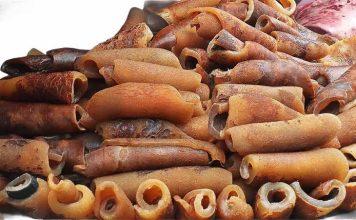Kpomo is a type of cow skin that is enjoyed by people from various social classes. It is obtained as a by-product from the meat processing industry where it is set aside to be transformed into other products.
Many individuals incorrectly assume that cow skin lacks nutritional value, yet it is rich in collagen, a crucial protein for supporting bone and skin structure. Research indicates that cow skin contains significant mineral levels, which vary based on the processing method.
In addition to its health benefits, consuming kpomo can lead to certain medical issues, such as:
1. Colorectal disease The method of preparing cow skin products has been linked to an elevated risk of colorectal diseases, including colon cancer. Studies have indicated a correlation between the consumption of such products and the incidence of colorectal diseases, highlighting the importance of understanding these health implications. Therefore, it is essential to be aware of the potential health risks associated with consuming kpomo and take necessary precautions to safeguard against these dangers.
2. Kidney and liver Damage Many people are concerned about the potential harm to their kidneys and livers from consuming kpomo due to the use of formaldehyde in its preservation process. Some traders of kpomo use formaldehyde, also known as formalin, to enhance the thickness and size of the kpomo for increased profit. However, the accumulation of formaldehyde in the body can lead to severe damage to the kidneys and liver.
3. Cancer The process of roasting cow skin often involves burning materials like tyres and dustbin composites, which can release harmful substances such as Polycyclic Aromatic Hydrocarbons (PAHs). Exposure to these compounds poses a significant risk of developing cancer, increasing the health hazards associated with consuming kpomo.
